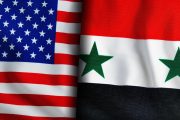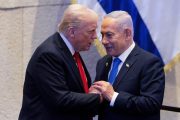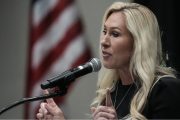If President Obama is supporting al-Qaeda, the Taliban, or associated forces, should he be subject to indefinite detention under the terms of the National Defense Authorization Act (NDAA)?
As The New American has chronicled since it was first proposed, the NDAA purportedly authorizes the president of the United States to deploy the armed forces to apprehend and indefinitely detain anyone suspected of providing support to terrorists. Section 1021 of the NDAA reads in relevant part:
Congress affirms that the authority of the President to use all necessary and appropriate force pursuant to the Authorization for Use of Military Force (Public Law 107-40; 50 U.S.C.1541 note) includes the authority for the Armed Forces of the United States to detain covered persons (as defined in subsection (b)) pending disposition under the law of war.
A covered person under this section is any person as follows:
A person who was a part of or substantially supported al-Qaeda, the Taliban, or associated forces that are engaged in hostilities against the United States or its coalition partners, including any person who has committed a belligerent act or has directly supported such hostilities in aid of such enemy forces.
And, finally:
Detention under the law of war without trial until the end of the hostilities authorized by the Authorization for Use of Military Force.
A plain reading of Section 1021 reveals, then, that anyone who is found to have “substantially supported” al-Qaeda or associated forces can be detained by the military until the end of the War on Terror. Now, the relevant question becomes: Has President Obama substantially supported al-Qaeda and if so, how?
To begin our inquiry, let’s take a look at a recent article published by Reuters. In this article dated August 1 detailing a secret order signed by President Obama providing support to Syrian rebel forces opposing the regime of Bashar al Assad, Reuters writes that “Recent news reports from the region have suggested that the influence and numbers of Islamist militants, some of them connected to al Qaeda or its affiliates, have been growing among Assad’s opponents.”
The next day, The New American’s Alex Newman covered the same story, writing that: “…Western governments, brutal Sunni-Arab dictatorships, an assortment of terror groups including al-Qaeda, and other powerful interests have all been backing the uprising since long before violence even broke out last year.”
Later that same day, in a story covering the violence of the Syrian uprising, the BBC reported:
The al-Qaeda-styled group in Syria is Jabhat al-Nusra li-Ahl al-Sham (the Front for the Protection of the Syrian People).
Like other al-Qaeda affiliated groups, al-Nusra’s statements and videos are usually issued by its own media group, al-Manara al-Baida (the White Minaret) in Syria.
Al-Nusra has claimed responsibility for several attacks against the Syrian army, security and shabiha (state-sponsored thugs) since it announced its formation early this year.
Finally, under a headline reading “Al-Qaida turns tide for rebels in battle for eastern Syria,” the Guardian (U.K.) reports:
They try to hide their presence. “Some people are worried about carrying the [black] flags,” said Abu Khuder. “They fear America will come and fight us. So we fight in secret. Why give Bashar and the west a pretext?” But their existence is common knowledge in Mohassen. Even passers-by joke with the men about car bombs and IEDs [improvised explosive devices].
According to Abu Khuder, his men are working closely with the military council that commands the Free Syrian Army brigades in the region. “We meet almost every day,” he said. “We have clear instructions from our [al-Qaida] leadership that if the FSA need our help we should give it. We help them with IEDs and car bombs. Our main talent is in the bombing operations.” Abu Khuder’s men had a lot of experience in bomb-making from Iraq and elsewhere, he added.
The foregoing accounts of the hostilities in Syria provide nearly irrefutable evidence that numerous al-Qaeda militants are found among the ranks of Syrian rebels (particularly within the Free Syrian Army), including among those filling leadership roles within those forces.
Now that such a presence has been proven, the inquiry into whether the President of the United States has provided “substantial support” to al-Qaeda in violation of the NDAA, an act he signed into law on December 31, 2011, moves to the “secret order” mentioned above.
From Alex Newman’s report:
President Obama has signed a secret order purporting to authorize even more “covert” U.S. government support to the armed opposition. Multiple establishment press outlets reported the latest development citing official sources, indicating that the administration likely released the news for a purpose.
According to media reports, Obama’s latest secret “intelligence” order claims to grant the Central Intelligence Agency (CIA) and other U.S. government agencies even broader latitude in supporting the “revolutionaries.”
Exactly what the nature of the support that the president authorized the CIA to give to the Free Syrian Army is unknown. However, what is known is that late last month the U.S. Treasury Department approved a license granting to a group known as the Washington Syrian Support Group power to provide direct financial assistance to the Free Syrian Army. According to CNN’s account of the Treasury’s decision, “The Washington-based representative of the Free Syrian Army is allowed to conduct financial transactions on the rebel group’s behalf but is not allowed to send military equipment.”
In addition to the financial assistance facilitated by the U.S. Treasury, the State Department has allocated $25 million for “nonlethal” assistance to the Syrian opposition, in addition to the $64 million in humanitarian assistance earmarked for Syria.
Perhaps, some may argue, President Obama is not aware of the presence of al-Qaeda militants in the Syrian opposition. Unless he doesn’t talk to members of his cabinet, such an assertion is unsupportable.
At a press conference in May, Secretary of Defense Leon Panetta admitted, “We do have intelligence that indicates an al-Qaeda presence in Syria.” So much for not knowing.
Then at a briefing in Washington, D.C. in July, the State Department’s Coordinator for Counterterrorism, Daniel Benjamin, recognized the influence and contribution of al-Qaeda to the Free Syrian Army’s cause. Said Benjamin:
So long as Assad refuses to go and Syria’s transition is blocked, the danger grows of more foreign fighters, including extremists of the al-Qaida type, infiltrating Syria. We are not — we are very much alert to this issue. We’ve spoken with the Syrian opposition groups and warned them against allowing such fighters to infiltrate their organizations. They’ve assured us that they are being vigilant and want nothing to do with AQ or with violent extremists. And I should add that the Free Syrian Army has issued several statements urging foreign fighters to leave Syria.
Apparently the Obama administration’s answer to the FSA’s embrace of al-Qaeda is to “just say no.” Not that their refusal to reject al-Qaeda recruits will keep the money from flowing, however.
In light of the weight of the foregoing evidence, little if any doubt remains that President Obama is knowingly providing “substantial support” to al-Qaeda and associated forces operating in Syria. He is thereby violating Section 1021 of the NDAA and is subject to indefinite detention by the armed forces of the United States.
In fairness, however, President Obama is not alone in this unlawful endeavor. Congressional leaders calling for U.S. military intervention in Syria on behalf of the rebels — whose ranks are rife with al-Qaeda militants — are complicit in the propping up of our supposed enemy in the never-ending War on Terror and should rightfully be apprehended and detained until the end of these hostilities.
Photo: In this July 29, 2012 photo, Free Syrian Army soldiers are seen in a vehicle at the border town of Azaz, some 20 miles (32 kilometers) north of Aleppo, Syria: AP Images




